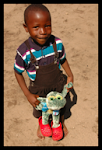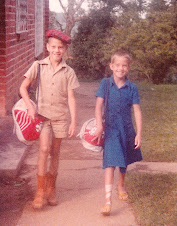CROCS FOR ORPHAN TOTS:
Collecting new and used Crocs for 200 orphans in the Congo, Africa.
Sunday, February 24, 2008
When is the Next Trip to Deliver the Crocs?
The trip is scheduled to leave on April 2nd, 2008. PLEASE HELP ME collect more Crocs by then. I have 4 pairs as we speak and I would like to have at least 20 pairs.
Crocs Update!
I just received word from the orphanage about the crocs. They have never had such great shoes for these children as the Crocs we have sent. They said that most of the shoes that have been donated in the past (flip-flops, sandals, sneakers) just have not held up and most of them don't last more than a couple of weeks due to the rough terrain, but the Crocs are doing great.
One of the biggest head aches in the past for the orphanage director has been keeping these children in footwear. We are hoping to change that with everyones help.
Keep them coming!
One of the biggest head aches in the past for the orphanage director has been keeping these children in footwear. We are hoping to change that with everyones help.
Keep them coming!
Friday, February 1, 2008
How did I become involved with this project?

When I was 6 y/o my parents moved from Kentucky in the United States to Rwanda, Africa where my father took a post as a physician and hospital administrator at a mission compound called Mugonero Hospital. It was 6 hour drive from the capital city of Kigali at about 10 mph, over the worst roads (if you can call them roads) imaginable. Mugonero being very remote was one of the most breathtaking places on earth. It was on a hillside overlooking Lake Kivu and in the distance at night you could see the faint lights of the Island of Idjwi in Zaire (now the Democratic Republic of Congo) in the middle of the lake.
After a few months my father became frustrated with a few things. First, the locals did not travel away from their villages to seek help at a western hospital until it was too late to help them, and most of them died from preventable diseases like dysentery or malnutrition. Also most Rwandans had never seen foreigners ("abazungu") before and were timid of seeking their help. So my father started to think of a plan of how to help them solve some of their most basic health-care problems.
He wrote up a proposal for a grant to fund his plan and it was accepted. So we moved to the capital city of Kigali so he could get the project going. First, he trained locals from each region to be community health care workers/educators and sent them out to their villages and communities to initiate basic primary health care changes. Children were vaccinated, latrines were built, vegetable gardens planted and growth monitoring of children was begun. The population was taught hygiene and how to care for simple diseases. They were taught nutrition and the importance of sanitation for disease control. Dad would visit the dispensaries and health centres once each monthand see the individuals that the local health care workers could not manage on their own. Anyone who needed more complicated care was sent to the hospital.
This program was highly successful at getting health care to the people of the country. They were receptive to their own local health educator/provider and they were less timid of the foreigners providing their care as they had a liason in their local provider.
Even after our departure from Rwanda this program continued to function until the genocide of 1993-1994. During that time most of the health care workers were killed and much of the health-care infrastructure was destroyed.
Désiré Murhima,one of the nurses who worked with my Dad was from Zaire (now the Democratic Republic of Congo). Désiré returned from Rwanda to the Congo and continued his studies in Nursing at the University of Bukavu. He began setting up clinics in the rural areas of Congo around Lake Kivu and in 1990 he organized PROLASA, a non-governmental development organization which is based out of Goma in the province of North Kivu. Désiré patterned his work in Congo after what he had seen my Dad doing in Rwanda 10 years before.
In 2000, Désiré came to Montreal, Quebec to further his education and while there, he and my Dad got together again and renewed their friendship from years before. Dad learned what Désiré was doing in the Democratic Republic of Congo and together with the help of International Children's Care based in Vancouver, Washington, they began helping 200 orphaned and abandoned children in the Congo. Dad began visiting Congo on a regular basis and has been providing medical care, logisitical support, training and administrative help to PROLASA since that time.
Dad works in Canada in my hometown of Plaster Rock, New Brunswick part of the year and volunteers his time to the PROLASA projects in any way he can. He is a Medical Doctor who has his Masters in Public Health and a Diploma in Tropical Medicine and Hygiene, so along with his vast experience he is well qualified to serve their medical needs. He travels over to the Congo many times a year always paying his own way and giving his services to the people we grew to love while we lived there.
This has all come full circle for our family and the people of this region feel like family to us. I went back to visit Rwanda in 2001 and introduced this country to my husband. The moment I stepped off the plane I knew that I had come back home!
Last year I received a PROLASA newsletter which showed the poor footwear these children had and asking anyone who could help with footwear to please do so. That is when I came up with this project to provide these children with Crocs which is a great and durable footwear that can be passed on from one orphan to the next as they outgrow them.
Subscribe to:
Posts (Atom)





